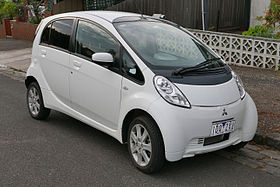This article has multiple issues. Please help improve it or discuss these issues on the talk page. (Learn how and when to remove these messages)
|
| Mitsubishi i-MiEV | |
|---|---|
 | |
| Overview | |
| Manufacturer | Mitsubishi Motors |
| Also called | Peugeot iOn (Europe) Citroën C-Zero (Europe) Mitsuoka Like |
| Production | 2009–2021 2009–2014 (Europe) |
| Assembly | Japan: Kurashiki, Okayama (Mizushima Plant) |
| Body and chassis | |
| Class | Kei car (Japan) City car (outside Japan) |
| Body style | 5-door hatchback |
| Layout | RMR |
| Related | Mitsubishi i Mitsubishi Minicab MiEV |
| Powertrain | |
| Electric motor | 47 kW (63 hp), 180 N⋅m (133 lbf⋅ft) permanent-magnet motor[1] |
| Transmission | Single speed reduction gear |
| Battery | 16 kWh / 58 MJ (Li-ion battery) |
| Range | 160 km (99 mi) (Japanese cycle) 100 km (62 mi) (US EPA cycle) |
| Plug-in charging | 15 A 240 V AC (3.6 kW)[2] on the SAE J1772-2009 inlet, optional CHAdeMO DC rapid charging, adapters for domestic AC sockets (110–240 V) |
| Dimensions | |
| Wheelbase | 2,550 mm (100.4 in) |
| Length | 3,395 mm (133.7 in) 3,480 mm (137.0 in) (Japan 2018-2021) 3,680 mm (144.9 in) (North America)[3] |
| Width | 1,475 mm (58.1 in) 1,585 mm (62.4 in) (North America)[3] |
| Height | 1,600 mm (63.0 in) 1,615 mm (63.6 in) (North America)[3] |
| Curb weight | 1,080 kg (2,380 lb) |
| Chronology | |
| Predecessor | Mitsubishi i |
| Successor | Mitsubishi eK X EV (Japan) Citroën Ami (Europe) |
The Mitsubishi i-MiEV (MiEV is an acronym for Mitsubishi innovative Electric Vehicle[4]) is a five-door electric city car produced in the 2010s by Mitsubishi Motors, and is the electric version of the Mitsubishi i. Rebadged variants of the i-MiEV are also sold by PSA as the Peugeot iOn and Citroën C-Zero, mainly in Europe. The i-MiEV was the world's first modern highway-capable mass production electric car.[5][6]
The i-MiEV was launched for fleet customers in Japan in July 2009, and on April 1, 2010, for the wider public.[7] International sales to Asia, Australia and Europe started in 2010, with further markers in 2011 including Central and South America. Fleet and retail customer deliveries in the U.S. and Canada began in December 2011.[8][9] The American-only version is larger than the Japanese version and has several additional features.[10][11]
According to the manufacturer, the i-MiEV all-electric range is 160 kilometres (100 mi) on the Japanese test cycle. The range for the 2012 model year American version is 62 miles (100 km) on the United States Environmental Protection Agency's (US EPA) cycle. In November 2011 the Mitsubishi i ranked first in EPA's 2012 Annual Fuel Economy Guide, and became the most fuel efficient EPA certified vehicle in the U.S. for all fuels ever, until it was surpassed by the Honda Fit EV in June 2012 and the BMW i3, Chevrolet Spark EV, Volkswagen e-Golf, and Fiat 500e in succeeding years.[12][13]
As of July 2014[update], Japan ranked as the leading market with over 10,000 i-MiEVs sold, followed by Norway with more than 4,900 units, France with over 4,700 units, Germany with more than 2,400 units, all three European countries accounting for the three variants of the i-MiEV family sold in Europe; and the United States with over 1,800 i-MiEVs sold through August 2014. As of early March 2015, and accounting for all variants of the i-MiEV, including the two minicab MiEV versions sold in Japan, global sales totaled over 50,000 units since 2009.[6]
- ^ "Our Journey Toward Public EV Quick-Charging Begins". Wired. Autopia. 2010-05-26. Retrieved 2010-06-02.
- ^ "2012 i-MiEV Specifications". Canada: Mitsubishi. Archived from the original on 2012-01-22. Retrieved 2013-08-08.
- ^ a b c Cite error: The named reference
MMC101108was invoked but never defined (see the help page). - ^ Cite error: The named reference
AP100331was invoked but never defined (see the help page). - ^ Cite error: The named reference
FirstEV_1was invoked but never defined (see the help page). - ^ a b Cite error: The named reference
FirstEV_2was invoked but never defined (see the help page). - ^ Cite error: The named reference
Reuters100330was invoked but never defined (see the help page). - ^ Cite error: The named reference
USFirstwas invoked but never defined (see the help page). - ^ Cite error: The named reference
USFirst2was invoked but never defined (see the help page). - ^ Cite error: The named reference
USPricewas invoked but never defined (see the help page). - ^ Ian Palmer (2012-03-14). "2012 Mitsubishi i-MiEV gains traction in Canada". CarPages.ca. Archived from the original on 2013-10-13. Retrieved 2012-03-20.
- ^ Cite error: The named reference
EPAmost02was invoked but never defined (see the help page). - ^ Cite error: The named reference
FitEVwas invoked but never defined (see the help page).